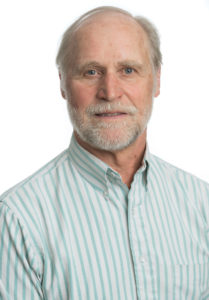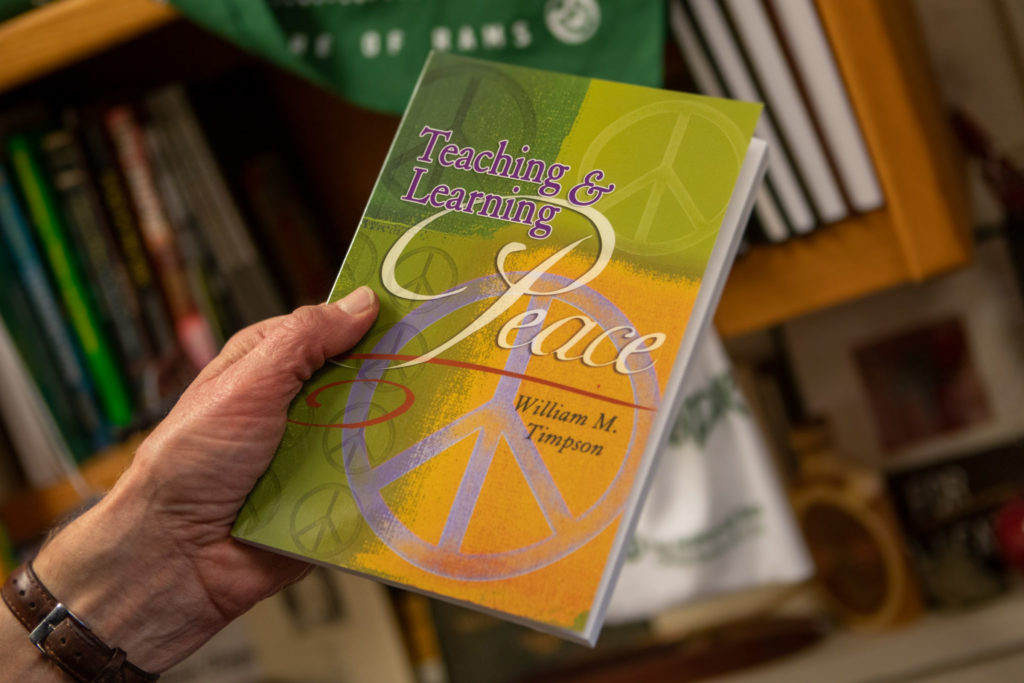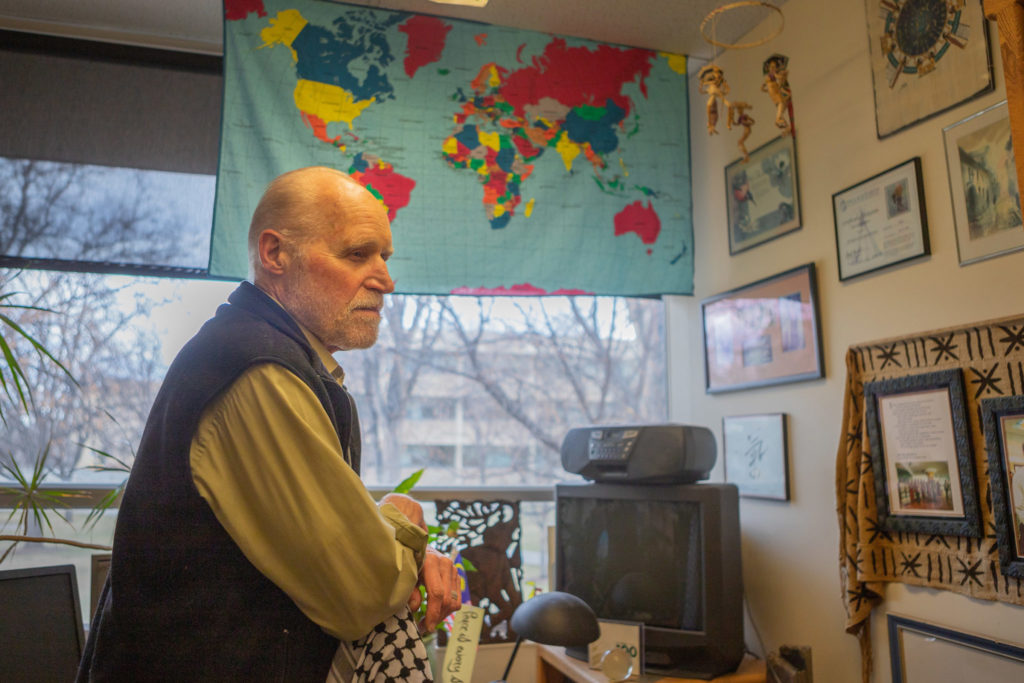 School of Education professor William Timpson retired this year after 44 years at Colorado State University. Over these years, Timpson’s impact on education programs and students at CSU, as well as international students and communities, reflects a career of scholarship, service, and innovation.
School of Education professor William Timpson retired this year after 44 years at Colorado State University. Over these years, Timpson’s impact on education programs and students at CSU, as well as international students and communities, reflects a career of scholarship, service, and innovation.
From Harvard to CSU
Timpson earned his bachelor’s degree in American History at Harvard University in 1968, then taught middle and high school students in the inner city of Cleveland, Ohio, at a tumultuous time when protests spiked after the killings of Dr. Martin Luther King, Jr., and Robert Kennedy. He got his Ph.D. in educational psychology at the University of Wisconsin-Madison, focusing on better understanding cross-cultural differences and challenges.
After a position opened up at CSU in educational psychology and human relations in the School of Education, career counselors at UW-Madison encouraged him to apply. Ever since, Timpson has been an instrumental part of the School of Education.
Creating endless opportunities
Timpson’s impact on the School of Education can be seen throughout his four decades in the unit. He was active in the design and creation of the current Education, Equity, and Transformation doctoral program, along with the programs that preceded it – Education Sciences, and Educational Leadership, Renewal and Change. Timpson also taught in the Center for Educator Preparation’s teacher licensure program and helped to develop CEP’s Education Sciences M.Ed. program.
School of Education professor and EET colleague Gene Gloeckner describes Timpson as a jack of all trades.
“Bill has been chair of nearly everything one can imagine,” he said. “He has been chair of multiple doctoral programs in education, in general. He was a big contributor to and supporter of our interdisciplinary Ph.D. program. His love of international programs of all sorts was influential in getting several international doctoral students in our School of Education. He was the key person for bringing many Malaysian doctoral students to our school. Those students became leaders at their institutions in Malaysia and remain so today.”
While Timpson advanced the School of Education in many ways, he also wrote and co-authored 19 books, the most recent of which were published just last year. Through his writing, Timpson’s goal has been to make a difference in education.

“My biggest accomplishment in my career was writing and co-authoring 19 books on topics that I wanted to impact, from more effective and creative post-secondary instruction to promoting deeper learning about compelling issues – specifically diversity, sustainability, peace and reconciliation – that often divided communities and fomented conflicts,” said Timpson.
After his first book on peace education was published in 2002, Timpson developed a first-year seminar on peacemaking for the Honors program. He ended up teaching this every fall semester until his retirement. In similar fashion, he converted his books on teaching sustainability into a spring seminar, “Exploring Sustainable Solutions,” which he also taught until retirement.
Connecting all this was his involvement with CSU’s School of Global Environmental Studies, where Timpson helped create two interdisciplinary programs – one undergraduate and one graduate – on sustainable peacebuilding. Small grants form SoGES allowed him to produce two books on case studies that linked sustainability with diversity and peacebuilding content.
A mentor and an advocate
Timpson has been an important mentor for doctoral students throughout the years. Doctoral student Hsiao-Ching Lin shares how Timpson’s mentorship has impacted her.
“As a Taiwanese Indigenous doctoral student and new immigrant to the U.S., Bill has mentored me through not only his studies but his life experiences,” she said. “He dedicates his weekly time to meeting with me when I feel there are some topics or books I want to talk about or study with him. I will miss his dedication to the doctoral students at the School of Education, as I’ve known that he also dedicates his time to other doctoral students in the same way.
“He is the kind of professor who genuinely makes me confident in my doctoral pursuit when I feel that studying a Ph.D. tends to be excruciating and self-depreciating,” continued Lin. “He always focuses on the goodness and greatness of people when he introduces them, making us feel that we are of great value in the world. I will miss studying and working with him on things we are concerned about, such as Indigenous education, doctoral students’ attrition, and peace around the world.”
An advocate in the classroom and an advocate in the community, Timpson has supported fellow faculty and doctoral students in their pursuit to make a difference in their community.
“Bill taught me to take breaths and trust in knowing that there is a way to move forward,” said Antonette Aragon, an associate professor in the School of Education and EET faculty member. “I will always thank him for standing with me and the parents who protested against the closing of Poudre School District schools. Together, we spoke at school board meetings, and he was willing to sit and strategize ways to ensure that K-12 students would not become dispersed and lose their neighborhood schools. Thanks, Bill, for caring and being an advocate with me.”
Campus impact
In 1978, Timpson helped to write and co-direct a federally-funded teacher corps project that linked CSU with a small community that had experienced racial conflict and violence with its migrant population.
CSU wasn’t the only higher education institution that benefited from Timpson’s expertise. He took a paid leave from CSU (1991-93) to serve as founding director of the Center for Teaching at the University of California-Santa Cruz. This was followed by another two years as a senior staff member for faculty development at the Tertiary Education Institute at the University of Queensland in Brisbane, Australia.
With those experiences under his belt, Timpson returned to CSU and was appointed the founding director of the Center for Teaching and Learning, where he led professional development efforts from 1997-2003.
International impact

Timpson’s impact is not restricted to northern Colorado – or even the United States. He is passionate about international conflict resolution, peace and reconciliation, diversity, and sustainability.
In 1981-84, Timpson was the recipient of a Kellogg National Fellowship to explore international conflicts and their implications for education. This fellowship allowed him to travel to Brazil, Nicaragua, and Cuba to explore literacy; Asia and Scandinavia to explore educational change; and Eastern Europe to study war, persecution, peace, and reconciliation.
In 2006, Timpson served as a Fulbright Specialist in peace and reconciliation studies at the University of Ulster’s UNESCO Center in Northern Ireland. In 2011, he was granted the position again at the University of Ngozi in Burundi, East Africa. Here, he continues to work with Rotary International Global Grants to infuse sustainable peace studies into the academic programs at the University of Ngozi. In spring of 2014, Timpson served as a Fulbright Teaching Scholar at Kyung Hee’s Graduate Institute of Peace Studies in South Korea. He also served as an evaluator for the Rotary Peace Center at the University of Queensland in Brisbane, Australia.
“Bill has shown me how you can follow your passions and make sure the work you do matters to local, national, and global communities,” said Daniel Birmingham, a School of Education associate professor and coordinator of the EET doctoral program.
Work doesn’t end with retirement
Now retired, Timpson has no plans to end work. He has recently signed a contract for another book to reflect on conflict, learning, and sustainable peacebuilding through his experiences in the U.S and overseas. He plans to pursue more Fulbright possibilities and to expand sustainable peacebuilding in Burundi, which the Rotary Foundation has actively supported. He has also been working with a colleague to develop the value of a focus on teaching and learning in the business world.
While his accomplishments are wide and varied, Timpson credits his success to a variety of people in his life.
“I feel very privileged to have come from a very humble, working class background to complete degrees at leading universities for undergraduate and graduate studies,” said Timpson. “My mother was a union organizer for textile workers after leaving school in the ninth grade to help support her family. Her leadership on progressive causes for working people made her a frequent target of the bosses, owners, and authorities. While arrested many times for speaking out, she was never convicted. My father came off the farm in Wisconsin, fought in two wars – the Spanish Civil War and World War Two – then helped dig tunnels in the Boston area because his progressive politics made him a marked man during the Red Scare hysteria of the 1950s.
“Building on this legacy, I took full advantage of the opportunities I had and was able to contribute original work in challenging areas of study and application,” he said. “I also owe much to colleagues and students who shared my values and these interests, who raised important questions and joined with me on these efforts. My older sister Kat had to survive those early years with me, and later helped to edit several of my books. And of course, much credit goes to the love and support I have had over all these years from my wife Gailmarie Kimmel and my two daughters, Kellee and Jayme – each of them bright, talented, and caring.”
The School of Education is part of CSU’s College of Health and Human Sciences.